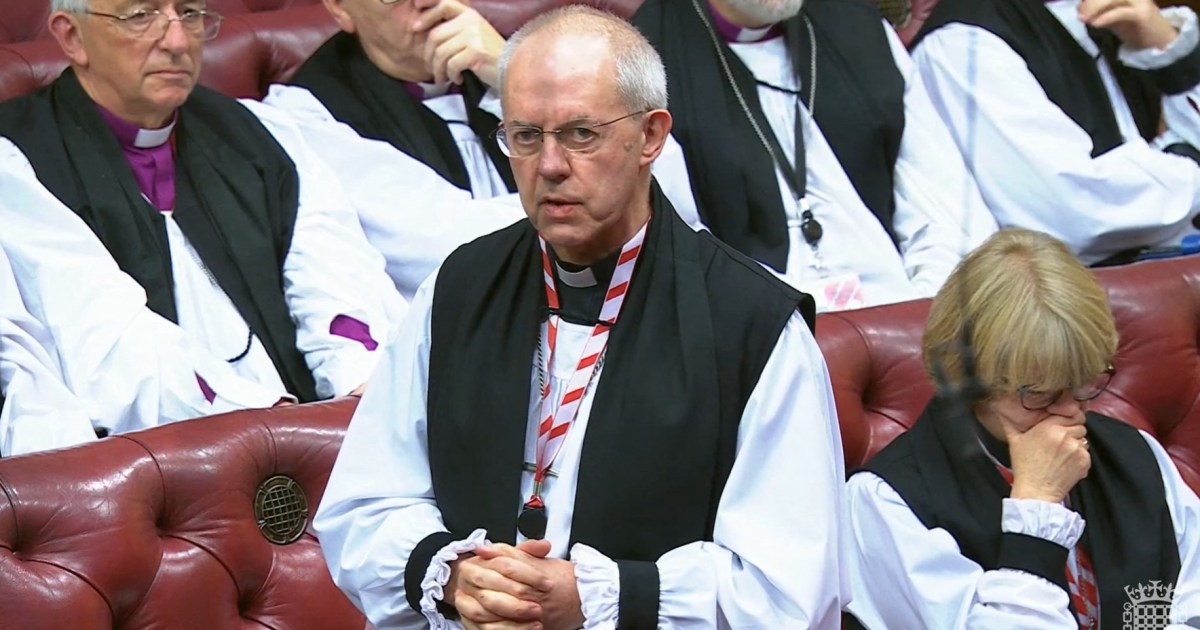The Church of England is facing a long overdue reckoning in Africa. Its leader, Archbishop of Canterbury Justin Welby, announced his resignation in November, after an independent review drew attention to his failure to report to authorities lawyer John Smith, who repeatedly abused children.
Smith was found to have physically, sexually and psychologically abused more than 100 boys and young men over four decades at Church of England summer camps in England, South Africa and my country Zimbabwe. He died in Cape Town, South Africa, in 2018 at the age of 77, without ever being held accountable.
An independent review of Smith’s alleged crimes, and the church’s attempts to cover them up, makes for harrowing reading.
His “horrific” abuse of boys in England was identified by the church as early as 1982, the review found, but it was never revealed to the public nor held accountable by the authorities. Instead, he was encouraged to leave the country and move to Zimbabwe without any referral to the police. He is believed to have physically and sexually abused at least 80 boys at camps he ran there in the 1990s.
Perhaps his most horrific crimes occurred in Marondera, outside Harare in December 1992. A 16-year-old boy named Jade Nyachor drowned under suspicious circumstances in a camp headed by Smith. Smith was initially charged with first-degree murder, but the case was mysteriously dropped after dragging on too long with little progress and numerous errors on the part of investigators. Smith eventually moved to South Africa, and has never faced accountability for his alleged role in Nyachor’s death.
Unfortunately, the abuse Smith inflicted on the boys in what was supposed to be a nurturing, religious environment for learning and growth was not an anomaly. In the years that Smith was active in my country, child abuse by clergy appears to have been endemic in many other places. I first became vaguely aware of allegations of abuse within my Catholic boarding school in 1989-90, when I was a pupil at the Jesuit-run St Ignatius College at Loyola, near Harare. There were rumors of things a few priests did to young boys. However, no one spoke about it openly or tried to do anything to stop it.
I learned about the true scope of clergy abuse in Catholic schools in Zimbabwe years later, when I began doing research for a novel I had just finished about clergy abuse at a fictional Catholic boarding school. As part of my research, I spoke directly to some boys, now men, who said they had been abused at my old school, and at two other elite Jesuit schools in Zimbabwe – St George’s College and St Francis Xavier, known as Kutama. They told of the horrific abuse to which vulnerable young boys were subjected with impunity.
During my interviews, the names of three priests were mentioned most often. I learned that, as was the case with Smith and the Anglican Church, the Catholic Church moved these men to various places to protect them from accountability. I was told that one of the three, whom two older boys said witnessed the rape of a young boy they had picked up on the street in Harare, was eventually taken to Mbare, one of the poorest towns in Zimbabwe. He allegedly found more victims there.
To date, only one of these three men has been tried and convicted for crimes against children, and thus his name can be mentioned in this article: James Channing Pierce.
In 1997, Channing Pierce was convicted of seven counts of indecent assault on boys at a Jesuit school in Lancashire, England, and was sentenced to three years in prison. However, the Catholic Church played no role in bringing Channing Pierce to justice. He only faced accountability because a former pupil at St George’s School in Zimbabwe, who was abused by Channing Pearce while there, recognized him in Australia. It was learned that the priest’s name had been mentioned in an investigation into historical abuse at the school in Lancashire and he had informed the British authorities. The investigation revealed that he had indeed abused children and was duly extradited from Australia and tried, convicted and sentenced in England. To this day, Channing Pierce has faced no accountability for his alleged child abuse in Zimbabwe
It is an acute tragedy of clerical abuse in Zimbabwe that Catholic schools such as St Ignatius, St George and Kutama attracted some of the brightest children from all over the country, many of whom won scholarships. Countless children from poor families saw these schools as their best chance to achieve something. It is sad to know that many of them did not receive the education and care they were promised, but were instead subjected to horrific abuse.
A reckoning must come to the Catholic and Anglican churches in Africa, just as happened in the United States and Europe. As they have done elsewhere, the Anglican and Catholic churches should launch full investigations into historical sexual abuse in their schools in Zimbabwe and elsewhere in Africa. African victims, like victims in other parts of the world, deserve accountability, if not justice.
In announcing his resignation over the mishandling of the Smith abuse scandal, Archbishop Welby said he hoped his decision to step down “demonstrates how seriously the Church of England understands the need for change and our deep commitment to creating a safer church.”
In 2018, the head of the Catholic Church, Pope Francis, fully acknowledged the same and apologized for his church’s failures to respond to clerical abuse.
In an unprecedented message to all Catholics in the world, he promised to spare no effort to prevent and cover up clerical sexual abuse.
“For too long, the agonizing pain of these victims, crying out to Heaven, has been ignored, muted or muted,” the Pope wrote. “With shame and repentance, we acknowledge as a church community that we were not where we should have been, and that we did not act in a timely manner, realizing the scale and seriousness of the damage caused to so many lives. We showed no concern for the little ones; we abandoned them.”
It is a great relief and relief to see that after decades of silence and attempted cover-ups, the Catholic and Anglican Churches are finally admitting the wrongs of the past and promising to do everything they can to protect children in the future. But so far, their repentance seems directed only toward white victims of clerical abuse in the West.
However, children in Zimbabwe and throughout Africa suffered from predatory priests as much as their white peers in England, Ireland, and the United States. Churches need to take quick and meaningful action to acknowledge their pain and offer these broken boys, now men, a chance at justice. Failure to do so means that victims of clerical abuse do not matter as long as they are black Africans.
The opinions expressed in this article are those of the author and do not necessarily reflect the editorial position of Al Jazeera.




